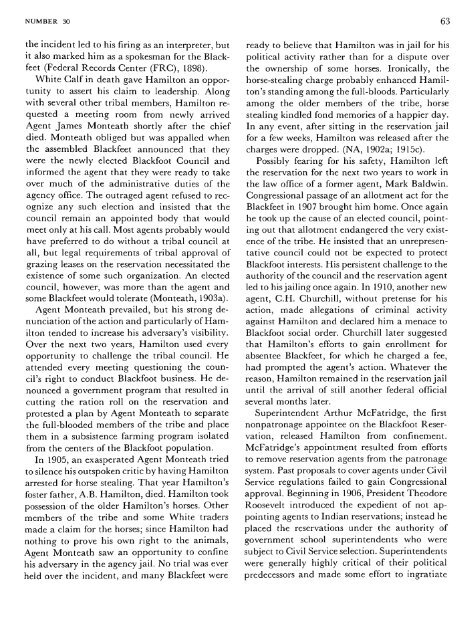Plains Indian Studies - Smithsonian Institution Libraries
Plains Indian Studies - Smithsonian Institution Libraries
Plains Indian Studies - Smithsonian Institution Libraries
Create successful ePaper yourself
Turn your PDF publications into a flip-book with our unique Google optimized e-Paper software.
NUMBER 30 63<br />
the incident led to his firing as an interpreter, but<br />
it also marked him as a spokesman for the Blackfeet<br />
(Federal Records Center (FRC), 1898).<br />
White Calf in death gave Hamilton an opportunity<br />
to assert his claim to leadership. Along<br />
with several other tribal members, Hamilton requested<br />
a meeting room from newly arrived<br />
Agent James Monteath shortly after the chief<br />
died. Monteath obliged but was appalled when<br />
the assembled Blackfeet announced that they<br />
were the newly elected Blackfoot Council and<br />
informed the agent that they were ready to take<br />
over much of the administrative duties of the<br />
agency office. The outraged agent refused to recognize<br />
any such election and insisted that the<br />
council remain an appointed body that would<br />
meet only at his call. Most agents probably would<br />
have preferred to do without a tribal council at<br />
all, but legal requirements of tribal approval of<br />
grazing leases on the reservation necessitated the<br />
existence of some such organization. An elected<br />
council, however, was more than the agent and<br />
some Blackfeet would tolerate (Monteath, 1903a).<br />
Agent Monteath prevailed, but his strong denunciation<br />
of the action and particularly of Hamilton<br />
tended to increase his adversary's visibility.<br />
Over the next two years, Hamilton used every<br />
opportunity to challenge the tribal council. He<br />
attended every meeting questioning the council's<br />
right to conduct Blackfoot business. He denounced<br />
a government program that resulted in<br />
cutting the ration roll on the reservation and<br />
protested a plan by Agent Monteath to separate<br />
the full-blooded members of the tribe and place<br />
them in a subsistence farming program isolated<br />
from the centers of the Blackfoot population.<br />
In 1905, an exasperated Agent Monteath tried<br />
to silence his outspoken critic by having Hamilton<br />
arrested for horse stealing. That year Hamilton's<br />
foster father, A.B. Hamilton, died. Hamilton took<br />
possession of the older Hamilton's horses. Other<br />
members of the tribe and some White traders<br />
made a claim for the horses; since Hamilton had<br />
nothing to prove his own right to the animals.<br />
Agent Monteath saw an opportunity to confine<br />
his adversary in the agency jail. No trial was ever<br />
held over the incident, and many Blackfeet were<br />
ready to believe that Hamilton was in jail for his<br />
political activity rather than for a dispute over<br />
the ownership of some horses. Ironically, the<br />
horse-stealing charge probably enhanced Hamilton's<br />
standing among the full-bloods. Particularly<br />
among the older members of the tribe, horse<br />
stealing kindled fond memories of a happier day.<br />
In any event, after sitting in the reservation jail<br />
for a few weeks, Hamilton was released after the<br />
charges were dropped. (NA, 1902a; 1915c).<br />
Possibly fearing for his safety, Hamilton left<br />
the reservation for the next two years to work in<br />
the law office of a former agent, Mark Baldwin.<br />
Congressional passage of an allotment act for the<br />
Blackfeet in 1907 brought him home. Once again<br />
he took up the cause of an elected council, pointing<br />
out that allotment endangered the very existence<br />
of the tribe. He insisted that an unrepresentative<br />
council could not be expected to protect<br />
Blackfoot interests. His persistent challenge to the<br />
authority of the council and the reservation agent<br />
led to his jailing once again. In 1910, another new<br />
agent, C.H. Churchill, without pretense for his<br />
action, made allegations of criminal activity<br />
against Hamilton and declared him a menace to<br />
Blackfoot social order. Churchill later suggested<br />
that Hamilton's efforts to gain enrollment for<br />
absentee Blackfeet, for which he charged a fee,<br />
had prompted the agent's action. Whatever the<br />
reason, Hamilton remained in the reservation jail<br />
until the arrival of still another federal official<br />
several months later.<br />
Superintendent Arthur McFatridge, the first<br />
nonpatronage appointee on the Blackfoot Reservation,<br />
released Hamilton from confinement.<br />
McFatridge's appointment resulted from efforts<br />
to remove reservation agents from the patronage<br />
system. Past proposals to cover agents under Civil<br />
Service regulations failed to gain Congressional<br />
approval. Beginning in 1906, President Theodore<br />
Roosevelt introduced the expedient of not appointing<br />
agents to <strong>Indian</strong> reservations; instead he<br />
placed the reservations under the authority of<br />
government school superintendents who were<br />
subject to Civil Service selection. Superintendents<br />
were generally highly critical of their political<br />
predecessors and made some effort to ingratiate

















